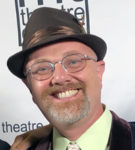By Eric George Tauber

SAN DIEGO — I remember hearing a story about a ten-year old Jewish boy exploring his grandmother’s house. In the closet by the front door, he found a small suitcase filled with old photos and precious tchotchkes. When asked, his grandmother explained that these were relatives who had long since passed and mementos of great sentimental value.
“But why do you keep them in a suitcase by the front door?” he asked.
“Because, Bubeleh, you never know when you’ll have to leave in a hurry.”
This is a common story among Jews whose elders suddenly found themselves as refugees of the pogroms. By edict from the Czar, thousands were forced to leave the only place they had ever known. Decades later, even in the Goldeneh Medineh, the “Golden Land” of America, the fear of expulsion lingered.
Some of us, generations later, pay those places a visit. We want to breathe the air and touch the soil our grandparents tilled, deepening our sense of who we are. Such a pilgrimage brings Israeli actor Yehezkel Lazarov, clad in a modern red hoodie, to the train platform in Anatevka, Ukraine. He’s reading aloud a story by Sholem Aleichem and transforms into the most iconic character in all of Yiddish literature, Tevye. I loved his wry sarcasm as he carries on his many one-sided conversations with GYd.
And then the stage was filled with life. The exuberant shtetlniks of Anatevka came on singing and dancing: papas, mamas, sons and daughters, tradesmen, a sage rabbi and a crafty beggar. I wanted to get up there and dance with them.
Mel Weyn, Ruthy Froch and Natalie Powers had a loving-teasing chemistry as Tevye’s daughters, Tzeitel, Hodel and Chava. Mel Weyn was very expressive as she pushed her nebbishy would-be husband, Mótel, to ask for her hand. We root for Jesse Weil to find his voice and finally speak up for himself. Lean, wiry and energetic, Weil reminded me of a young Ray Bolger, best known as the Scarecrow in The Wizard of Oz.
Ryne Nardecchia gives us a radical young student, Perchik afflicted with a deep, gnawing anger, the kind that makes a man want to turn the world upside down and build it anew. He’s not wrong about what’s wrong, but he’s not right about the kind of society the Bolshevik Revolution will bring.
Natalie Powers is adorable as Chava. A bookish girl with a curious mind, she still follows her heart. Our hearts break as hers is pulled apart by the strings of family and faith, yet also by the charming Fyedka.
Joshua Logan Alexander looks for solace in a bottle as the conflicted Constable. He doesn’t want to carry out the pogrom. But he knows that if he doesn’t, they’ll just find someone who will. And that someone may ruthlessly enjoy it.
The scenic design by Michael Yeargan was a well-oiled machine with many moving parts. It was realistic enough to evoke a humble village with a water pump of raw, unvarnished wood while maintaining a storybook quality. Look closely and you’ll notice a stone chimney that’s slightly askew.
I was less enamored by Catherine Zuber’s costumes. Most of them were dressed in the dusty earth tones that you would expect, which made the Fiddler’s purple coat look very out of place. In the dream sequence, many of the ghosts were masked, making it difficult to emote. And Olivia Gjurich as Frumah-Sarah was confined to a rolling tower so tall it was impossible for her to reach down and strangle Tevye, missing a rather key moment in the scene.
A few dubious choices aside, Fiddler will have you clapping, stomping, shockeling and shouting “Mazel Tov!” along with the shtetlniks of Anatevka. Come down to the Civic Theatre for the Broadway Series production of Fiddler on the Roof playing through Sunday, June 2.
*
Tauber is a freelance writer who specializes in coverage of the arts. He may be contacted via eric.tauber@sdjewishworld.com